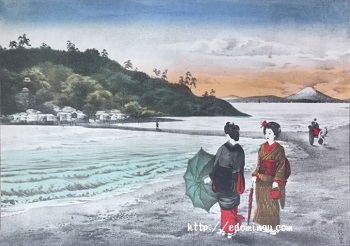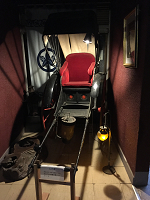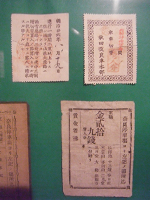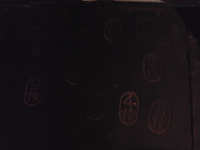人力車
Jinrikisha(Rickshaw)

明治22年石版画、 江の島の砂浜を走る人力車の図
おもしろ体験博物館
江戸民具街道の展示品紹介
Japanese Folk Art Museum
What you can see at Edo Mingu Kaido
Home >展示品紹介(Exhibits) >人力車(Jinrikisha)
1.運ぶ道具
Transportation related
人力車
Jinrikisha(Rickshaw)

明治22年石版画、 江の島の砂浜を走る人力車の図
明治時代になると人力車が登場します。人力車は日本人が明治初頭に発明したともいわれており、英語でRickshawと呼ばれています。今から100年以上前の19世紀末には20万台の人力車があったといわれています。明治時代に販売された旅行者用地図には人力車停車場から主要観光地までの距離が掲載されており、人力車に乗るための切符も販売されていて利用者が安心して利用できるようになっていたことが分かります。
江戸民具街道に展示されている明治時代の人力車は車輪が木製で鉄輪がはめ込んであります。車体下部には多数の焼き印が押されており、当時から車検制度があったことが分かります。人力車は車夫と乗客がバランスを維持しながら移動する乗り物です。車夫は体が空中に浮く姿勢になり少ない労力で牽引することが可能となります。
Jinrikisha came into use in the Meiji Period. It is
said that the Japanese invented jinrikisha since there is a governmental record
of authorizing three inventors in 1872 who started jinrikisha manufacturing and
transportation business at Nihonbashi, Tokyo. It is said that there were
more than 200,000 rickshaws by the end of 19th century in Japan. Some old maps
for travelers show
locations of jinrikisha stations with a cross reference table showing distance
to major
destinations; and jinrikisha tickets were sold for the convenience of passengers.
The jinrikisha on display at Edo Mingu Kaido has wooden wheels
with iron rings attached and on its body there are several burnt-in marks which
indicate there was an inspection regulation at that time. Jinrikisha is a
vehicle in which a driver and a passenger keep a balance; a driver virtually
floats in the air so that he can pull and run with a minimum strength.
| 明治期の人力車 Jinrikisha (The Meiji Period)  |
人力車の切符 The tickets of Jinrikisha  |
人力車の車体底に押された検査焼き印 Burnt-in marks under the body for inspection  |
<<<Previous 前のページ Next 次のページ>>>
おもしろ体験博物館江戸民具街道
神奈川県足柄上群中井町久所418
0465-81-5339
Japanese Folk Art Museum "Edo Mingu Kaido"
Address: 418 Kuzo, Nakai-machi, Ashigara-kamigun, Kanagawa-ken, Japan
Tel: 0465-81-5339